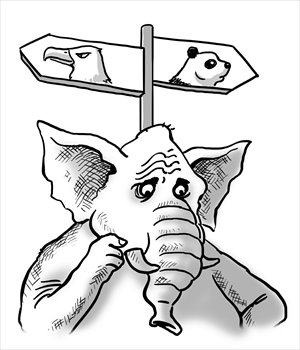Indian diplomacy won’t be dictated by US

Illustration: Liu Rui/GT
US Vice President Joe Biden's recent trip to India appears to have reinforced fears in China of a containment strategy. This notion exaggerates US policy and underestimates India as an independent strategic actor.
There is much to agree with in Fu Xiaoqiang's generally perceptive op-ed of August 12 in the Global Times. He correctly assesses unrealistic US expectations of India and India's economic challenges and shortcomings.
Some in the US have certainly had deeply unrealistic expectations about India as a counterweight to China.
Many US officials failed to grasp that India has viewed and will continue to view itself as an independent strategic actor, a preeminent power in South Asia, steeped in six decades of the non-aligned movement.
Similarly, many in the US have not fully appreciated India's economic challenges, protectionist policies, and the bureaucratic maze that constrain trade and foreign investment opportunities as well India's own growth.
But it is simply wrong and misunderstands cause and effect to suggest that the US is pushing "India to integrate into its system to contain China," or to argue that "the US not only encourages India to move East but also brings up the concept of 'Indo-Pacific' to justify India's intervention in Asia-Pacific Affairs."
Geography alone, not to mention its role as a maritime power and its economic interests, makes India an important actor in the Indo-Pacific regardless of its ties to the US. India's "Look East" policies have been aimed as much at building bridges and markets with ASEAN and other East Asian economies as at China.
The unrealized hopes of the 123 Agreement, known as the US-India Civil Nuclear Agreement, are a good example of both overblown US strategic hopes and the stark economic realities constraining US-India relations. No US firm has invested in India's nuclear industry due to New Delhi's failure to address liability issues.
Fu is correct when he says that India "is afraid of being reduced to a vassal of the US, which will block its path to becoming a great power…" But that is precisely why viewing India's behavior as being instigated by the US seriously underestimates India's strategic calculus and interests.
It is true that some in the US have had fantasies about India fully aligning with the US to counter China. But I would strongly disagree that strengthened US-India ties are necessarily aimed at China, or that India is part of any US anti-China conspiracy. India, like China, acts according to how it sees its own interests.
China's close alliance with Pakistan is viewed by some in India as containment. Is the China-Pakistan alliance aimed at India or is China just pursuing its own interests?
It also depends on how you define alliance. India is not and will not become a treaty ally of the US like Japan, South Korea or Australia. But to the degree it sees itself competing in Asia with China, it will work with the US if it judges that would promote its interests.
Some aspects of US-India relations will depend on China's behavior. If China claims territory that is under Indian control, moves troops into disputed areas and builds naval bases in Gwadar, India will view China with suspicion and be more likely to be antagonistic or be a strategic competitor regardless of the US.
But even in that case, India would tend to view the US as a useful counterweight to China, not as an ally to whom it is committed. Modern international relations are more complicated than a simple map of allies and enemies.
The author is a senior fellow of the Brent Scowcroft Center for International Security at the Atlantic Council. He served as a senior counselor to the Under-Secretary of State for Global Affairs from 2001 to 2004 and a member of the US Department of State Policy Planning Staff from 2004 to 2008. opinion@globaltimes.com.cn